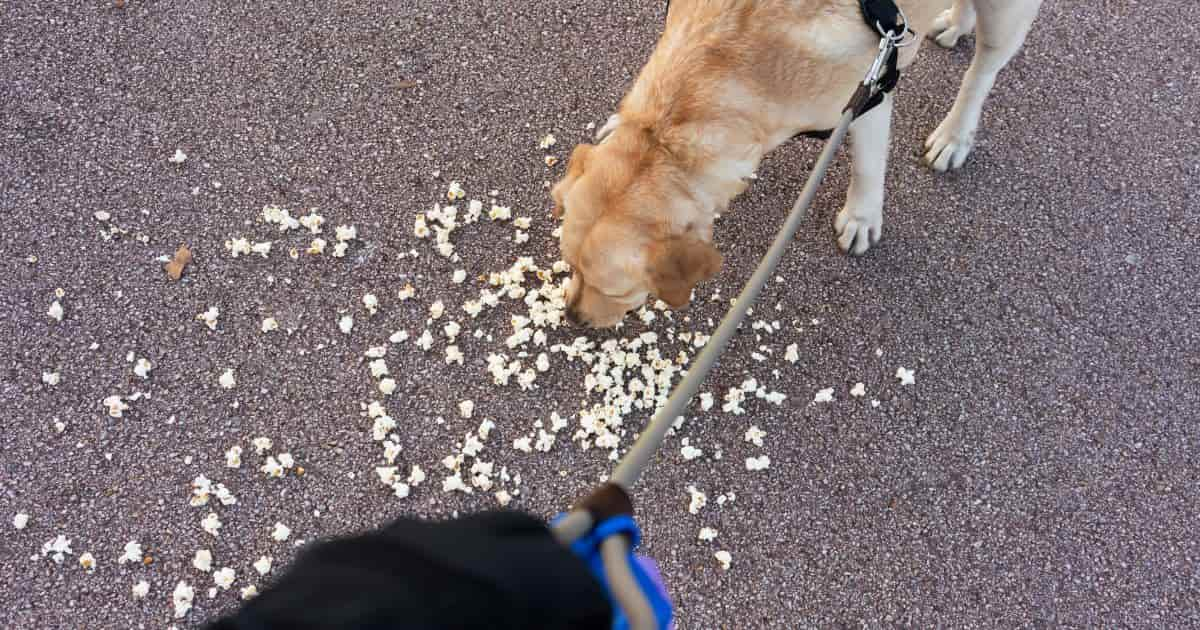If you’ve got a sweet tooth, you and your dog may have that in common. Dogs have 1,700 taste buds compared to a human’s 9,000, you would think your canine friend is limited in his desire for our mouth-watering food. But that’s not the case – they love and crave sweet treats and always want to have some of yours.
However, of all the treats, can dogs eat caramel popcorn? Also, what are the effects of consuming caramel popcorn or other popcorn? If these questions cross your mind, stick around for the answers, and let’s take care of your pet together.
Why is Popcorn Bad for Dogs?

Movie night may be incomplete without a bowl of popcorn. If you are a sucker for snacks, all types of popcorn will do, but you will likely love the caramel-flavored type.
Guess who would also be interested in sharing that bowl of caramel corn with you? Your canine friend!
However, popcorn is bad for dogs because it often comes with artificial flavors and toppings that transform the taste from plain to sweetened. Even when you prepare a plain batch, you must be mindful about how many pieces your pet consumes because of the high sodium and fat content.
As a responsible pet owner, you must monitor any human food your pet ingests. The rule of thumb is to keep treats, especially human ones, within ten percent of your dog’s daily diet.
Many of the human snacks you love are terrible for your pet’s health. A canine’s digestive system is in no way as advanced as yours. As a result, it’s challenging for their bodies to break down certain categories of food.
For instance, significant sugar consumption – relatively lower than what will harm a man will cause side effects like stomach upset. This is because the gut bacteria of a dog is built differently.
Also, it will accelerate the development of dental diseases in dogs. Tooth decay is more likely in cases where you fail to brush your dog’s teeth or ignore oral hygiene.
Canine nutrition is different from yours. Dogs do not have complicated nutritional requirements, so it is important to follow a diet recommended by a veterinarian. A certified practitioner will discourage you from feeding your dog any type of popcorn, whether cheese, buttered, or plain.
The sodium requirement for dogs is low and should be kept that way. Most dog foods and treats contain this mineral, but they are at controlled levels, and your pet gets an adequate level from his daily diet. Hence, you do not need to add any more.
If a dog eats popcorn, many things can happen, and nothing may also occur. It depends on the popcorn type, the dog’s body weight, and the quantity consumed.
Popcorn that contains items like xylitol should be kept away from dogs because this additive is detrimental. The same applies to chocolate-flavored types. Popcorn in moderation makes a great treat, but the excess will result in various health problems that we’ll discuss soon.
Can Dogs Eat Caramel Popcorn?
Generally, it depends on the quantity consumed, but it shouldn’t kill a dog immediately. Although the short-term effects are not desirable, thus you don’t want to take chances.
Caramel popcorn is unlikely to kill your dog, but if he consumes too much, like an entire bowl, that is an overload of calories. There is excess sugar in this sweetened treat, and it will cause short-term effects like a sugar overdose.
Also, the abnormal sugar influx will throw the gut bacteria off guard resulting in nausea, vomiting, and loose stools.
In the long run, if your pet continually shares your caramel treats with you, he will develop a sugar addiction. Also, obesity will eventually set in, and perhaps diabetes too.
However, that is often the height of it. The downside is that these conditions can develop into more technical ones like heart disease, which may be life-threatening if you don’t handle them accordingly.
What Happens if a Dog Eats Caramel Popcorn?
If a dog eats caramel popcorn, expect physiological side effects, although the gravity depends on how much your canine companion has consumed. A few pieces of popcorn may not have many side effects, but regular large batches will cause health issues.
Caramel popcorn can cause different health problems because this sweet treat contains lots of sugar. If anything, caramel-flavored snacks are notorious for containing more than fifty percent sugar.
This is a lot for a dog and may cause a sugar rush immediately after consumption. It causes an unhealthy heart rate spike, resulting in an undesirable energy level surge.
Also, your dog may get gum disease or other oral issues because of excessive sugar intake. Also, weight gain is an immediate to long-term effect, especially if you don’t quit feeding your pet unhealthy snacks.
In addition, excessive sugar may cause pancreatitis, an inflammation of the pancreas.
Caramel popcorn and other confectionary foods will increase the blood sugar level of your pet. When this spike is consistent for an extended period, it leads to diabetes mellitus.
Ingredients in Caramel Popcorn – Why are they Bad for Dogs

The ingredients in caramel popcorn reflect everything you should avoid feeding your dog. There is a limited calorie intake for pets too, and this type of popcorn exceeds it by a large degree. These ingredients include:
- Brown or white granulated sugar
- Butter (highly fatty)
- Heavy cream
- Salt (optional)
- Maple syrup or corn syrup
- Vanilla
- Peanuts
- Baking soda
The ingredients above are items you are familiar with if you enjoy confectionary treats. You can make a bowl of caramel popcorn yourself, but you need plain popcorn that contains salt.
You can eat caramel popcorn as much as you want, and your health may not reflect any adverse consequences, but it is different for dogs.
The materials you add to create the perfect flavor have excessive calorie content, and when combined, that is just an overload for a canine companion.
Butter alone is bad for dogs when consumed in the context of caramel popcorn. We all love buttery popcorn and would likely want to indulge when making a batch of caramel goodness, so chances are the amount you use is excessive for a pet dog.
This results in the consumption of a highly fatty snack for your pet.
Salt toxicity is also dangerous when giving your dog some of your caramel popcorn. Instead, consider baked dog treats.
Should Dogs Eat Salt?
Yes, sodium is good for dogs and is present in dog food and treats. However, the secret is balance – the right proportion can make or break your pet’s health.
The quantity of salt in popcorn is too much for your pet, especially if he gobbles up an entire bowl. The recommended intake for canines is 0.3 percent of the total food intake. Stick with that by keeping him away from foods that exceed that level.
Should Dogs Eat Butter?
Dogs can eat butter because it is not toxic to them, but it is a food type you should keep away from your pet because of its high fat content. Better and healthier alternatives are also great nutritional sources for pets.
Should Dogs Eat Heavy Cream?
No, you shouldn’t allow your dog to eat heavy cream because over fifty percent of dogs are lactose intolerant. Heavy cream contains a large amount of milk, leading to stomach upsets that may be dangerous depending on the quantity consumed.
It can result in diarrhea and constipation – the worst-case scenario is pancreatitis and kidney failure. However, that will be the case upon regular consumption, so it’s unlikely that your dog will get these symptoms from eating one or two pieces of caramel popcorn.
But you don’t want to encourage the habit, as it can be hard to break.
Should Dogs Eat Sugar?
Dogs should not eat excess sugar for many reasons, some of which are present in just about every section of this blog post. A dog’s digestive system is not advanced enough to properly digest sugars as adequately or efficiently as yours.
Conclusion
It’s normal for every pet lover to enjoy sharing their favorite things with their dog. But it’s not advisable to share caramel popcorn as the long-term effects aren’t favorable. However, there are healthier alternatives.
You can consider plain, air-popped popcorn if you must share it with your dog. Also, you can give the occasional piece of popcorn. But again, dogs with diabetes should not be given sweetened or salty treats.
If you have someone asking, “can dogs eat caramel popcorn?” let them know the answer is a resounding no.
